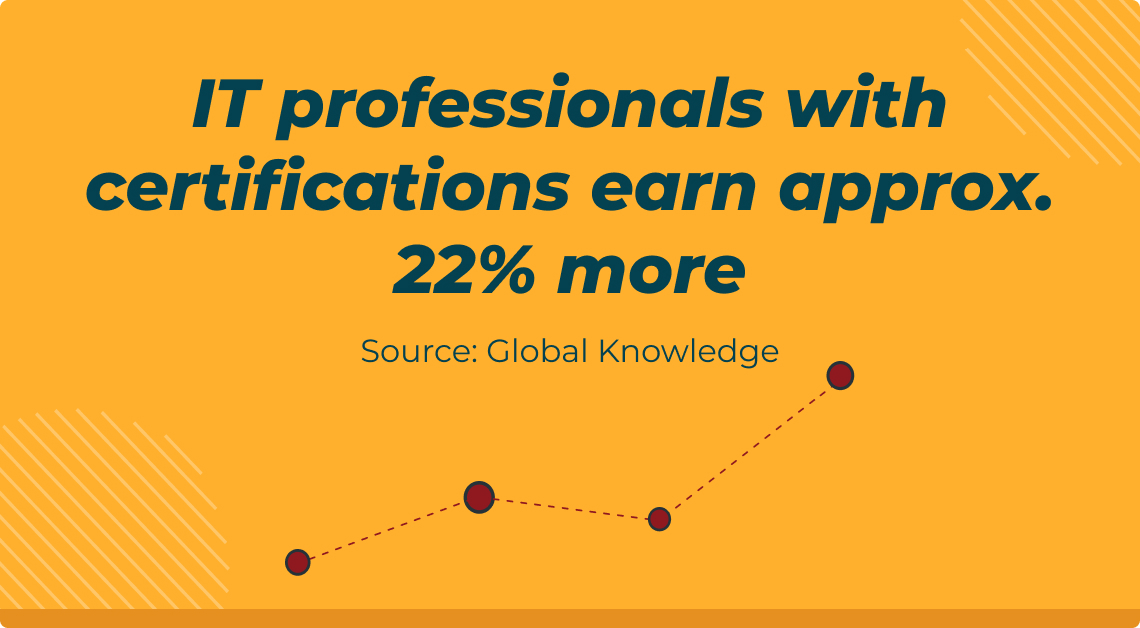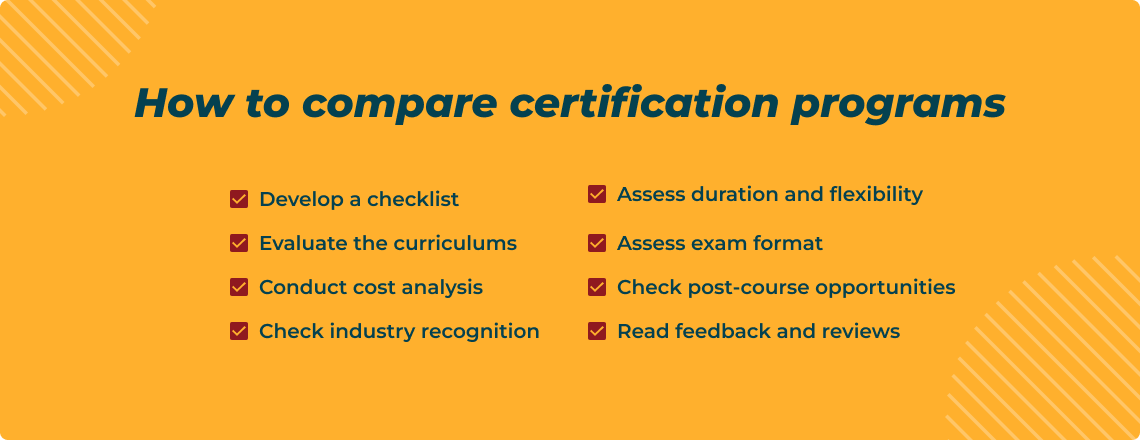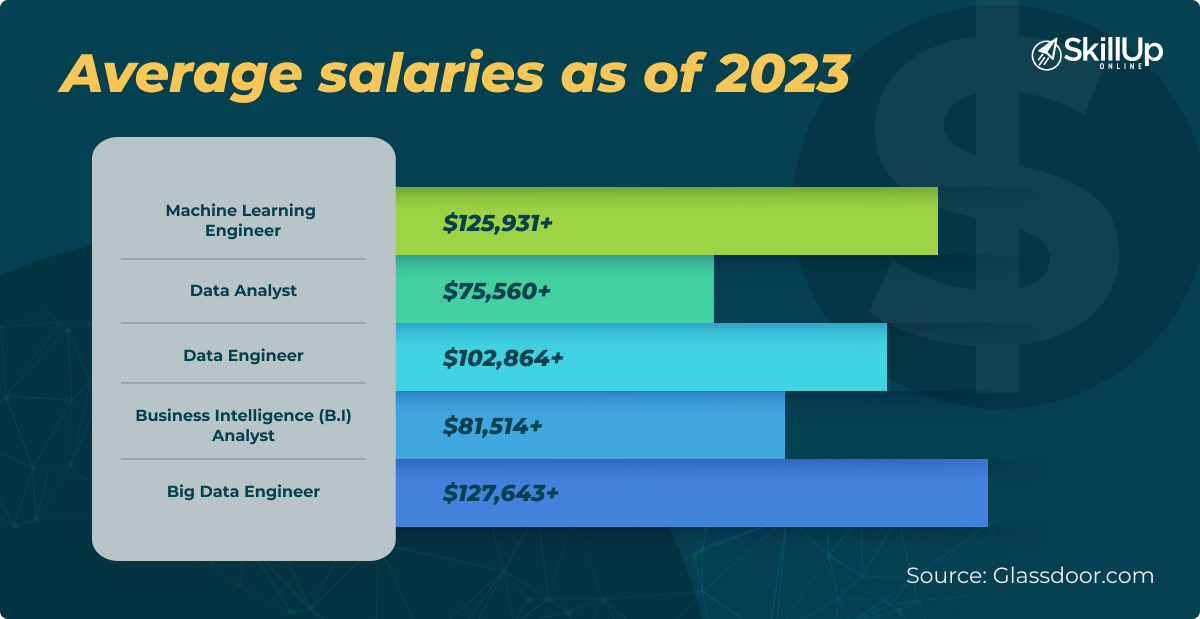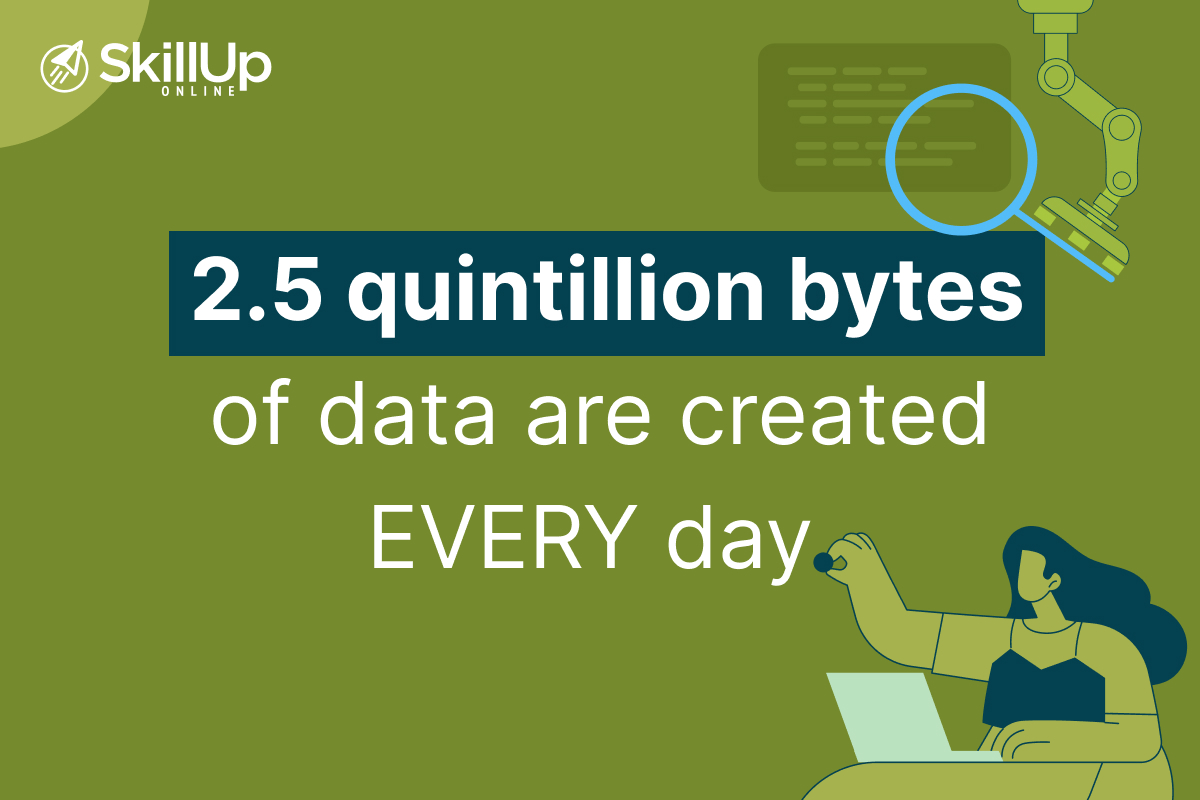In today’s fast-evolving tech landscape, data science stands as a cornerstone of innovation and progress. But with a myriad of certification options available, how do you choose the right path? This guide is your compass in the vast sea of data science certifications.
We delve into the nuances of selecting a certification that not only aligns with your professional skills but also amplifies your career trajectory. Whether you’re a budding data scientist or a seasoned professional seeking advancement, this step-by-step guide is designed to help you make an informed decision.
Why Pursue Data Science Certification?
Earning a certification not only validates your technical proficiency but also underlines your dedication to the domain. Here’s why many are gravitating towards these certifications.
- Industry Recognition: Certifications are often recognized by industry leaders, making certificate holders stand out during hiring processes. Employers understand the rigor of these programs and value the expertise they represent.
- Skill Enhancement Programs: These programs delve deep into data science topics, ensuring learners get hands-on experience and theoretical knowledge. For instance, SkillUp Online TechMaster Certificate Program in Artificial Intelligence (AI) with Data Science offers a comprehensive curriculum that equips professionals with real-world skills.
- Career Advancement: The Global Knowledge 2021 IT Skills and Salary Report indicates that IT professionals with certifications earn approximately 22% more than their non-certified counterparts. This demonstrates the tangible monetary benefits of being certified.
- Networking Opportunities: Being part of certification programs often opens doors to a vast community of like-minded professionals. This enables knowledge exchange and networking.
- Confidence Boost: Completing a rigorous certification program instills confidence, empowering professionals to tackle complex data challenges easily.
Data science certifications are a powerful tool in a professional’s arsenal, facilitating growth, recognition, and skill enhancement.
Types of Data Science Certification
Broadly categorised, we can differentiate data science certifications into two main types: vendor-specific and vendor-neutral certifications. Here’s a deeper dive into both.
Vendor-Specific Certifications
Definition: These are tied to specific platforms, tools, or vendors. They emphasize the functionalities, best practices, and intricacies of that particular tool or software.
Benefits:
- Deep Expertise: A vendor-specific certification signifies expertise in that particular technology or platform. For example, certifications from Microsoft or Google for their platform certifies you as an expert.
- Industry Recognition: Some tools and platforms are industry standards. Being certified in them can offer a competitive edge in job markets. For instance, becoming proficient in IBM’s AI tools with SkillUp Online Applied AI IBM Professional Certificate can elevate your professional standing.
- Tool Mastery: These certifications ensure that professionals are well-equipped to harness the full potential of a specific tool, maximizing efficiency and output. For example, certifications issued by CompTIA certifies you as an expert on various security tools and best practices.
Considerations: Such certifications might be limiting if the tool falls out of industry favor or if you switch to a role that uses a different platform.
Vendor-Neutral Certifications
Definition: These certifications focus on overarching principles, methodologies, and foundational data science knowledge without aligning to any specific tool or platform.
Benefits:
- Flexibility: Equips learners with skills that can be applied across various tools and platforms, offering flexibility in job roles and tasks.
- Broad Knowledge Base: Such courses, like AI for Everyone: Master the Basics, provide a holistic view of data science, ensuring a comprehensive understanding.
- Adaptability: As technologies evolve, professionals with vendor-neutral certifications can more easily adapt to new tools or platforms since their foundational knowledge remains strong.
Considerations: They offer broad knowledge, which allows you to seamlessly move between platforms or vendors without loss of expertise.
Your choice between vendor-specific and vendor-neutral certifications should be guided by your career aspirations, current or desired role, and preference for specialization versus versatility.
Assessing Your Goals and Interests
Embarking on a journey toward data science certification is commendable. Still, ensuring that your chosen path aligns seamlessly with your professional aspirations and interests is paramount. Here’s a guide to help you navigate this introspective process.
- Define Your Career Objectives: Begin by asking yourself pivotal questions. Are you aiming for a promotion, looking to switch job roles, or entering the field of data science afresh? Your objectives will play a critical role in guiding your certification choice. For example, suppose you’re keen on delving deep into AI applications. In that case, SkillUp Online AI Applications with Watson might be an apt choice.
- Pinpoint Your Passion: Data science is an expansive field, encompassing everything from deep learning to predictive analytics. Identify which areas resonate most with you. Are you more inclined towards theoretical understanding, or do you prefer hands-on application?
- Research Potential Roles: Explore job roles that align with your interests. Understanding the requirements and expectations of these roles can provide clarity on the certifications that would be most beneficial. Reading articles like Should I Choose a Career in AI or Data Science? can provide insights into different career paths.
- Consider the Investment: Certifications demand both time and financial investment. Ensure that your choice offers a rewarding return on investment regarding knowledge, skills, and potential career advancement.
- Seek Mentorship: Engaging with professionals in your desired field can provide invaluable insights. They can offer guidance on the most recognized and beneficial certifications based on real-world experience. By thoroughly assessing your goals and interests, you’ll be better positioned to choose a certification that elevates your professional trajectory and aligns with your passion and expertise.
Researching Certification Programs
Choosing the proper certification is akin to investing in your future. As with any investment, due diligence is crucial. Here’s a step-by-step guide to help you research and find the best fit:
- Start with Accredited Platforms: Prioritize platforms with a recognized track record in the industry. SkillUp Online, for instance, offers a variety of courses, from foundational topics like the Foundation of Artificial Intelligence & Machine Learning to more advanced ones.
- Dive into Course Curriculums: A deep dive into the course content will give you insights into the depth and breadth of a program. Ensure it covers both foundational topics and advanced modules relevant to your interests.
- Check Instructor Credentials: The expertise of instructors plays a pivotal role in the learning experience. Look for instructors with a blend of academic and real-world experience in data science.
- Look for Hands-on Learning: Theoretical knowledge is essential, but practical application solidifies understanding. Platforms like SkillUp Online offer hands-on practice via capstone projects that ensure you gain the requisite practical experience along with theoretical knowledge
- Read Reviews and Testimonials: First-hand experiences from past students can offer valuable insights. Browse through reviews, feedback, and testimonials to gauge the effectiveness and impact of the course.
- Compare Costs: While cost shouldn’t be the sole deciding factor, ensuring the program offers value for money is essential. Consider factors like course duration, content, and additional resources provided.
- Seek Recommendations: Engage with industry peers, mentors, or online forums. Personal recommendations often lead to discovering high-quality, lesser-known programs. Blogs like How Do I Get Started in AI? can also be valuable in your research journey.
- Mentoring Support: Check if the platform offers mentoring resources to aid real-world application and continuous learning.
By conducting thorough research, you ensure that your chosen certification not only aligns with your career goals but also provides a comprehensive and enriching learning experience.
Comparative Analysis of Certification Programs
With many data science certifications available, narrowing your options requires a systematic approach. A comparative analysis can help weigh each program’s pros and cons. Here’s a step-by-step method to streamline your decision-making.
- Develop a Checklist: Before diving into the comparison, jot down what you want in a certification. This could include course duration, hands-on projects, industry recognition, and post-course support.
- Evaluate the Curriculums: Look for courses that balance theoretical knowledge and practical application. For instance, SkillUp Online’s Deep Learning Fundamentals delves into conceptual understanding and hands-on projects, ensuring comprehensive learning.
- Conduct Cost Analysis: While quality education is invaluable, evaluating the financial aspect is essential. Compare course fees across platforms and consider additional costs, such as examination fees or study materials.
- Check Industry Recognition: Opt for certifications that are recognized and valued in the industry. Programs associated with renowned institutions or platforms often carry more weight on a resume.
- Assess Duration and Flexibility: While some prefer intensive short-term courses, others prefer extended, flexible options. Consider your daily schedule and commitments before deciding.
- Assess Exam Format: Understanding the examination’s format and requirements can be crucial. Some might be multiple-choice, while others could be project-based.
- Check Post-Course Opportunities: Some platforms provide post-course support, networking opportunities, or even job placement assistance. This can be a valuable criterion for many.
- Read Feedback and Reviews: Explore reviews from past students to get a sense of the course’s effectiveness, instructor quality, and overall experience. Reading testimonials can give genuine insights.
- Course Updates: The field of data science is ever evolving. Ensure that the course you opt for is updated regularly to include the latest trends and technologies.
- Seek Peer Insights: Engaging with peers, mentors, or professionals who have taken the course can provide first-hand feedback. Their experiences can guide your decision-making.
Armed with these evaluation criteria, you can make an informed choice, selecting a program that aligns perfectly with your aspirations and needs.
Certification Prerequisites and Requirements
Venturing into a data science certification program can be more complex than simply enrolling. Many certifications have prerequisites to ensure learners can grasp and benefit from the curriculum. Here’s what potential learners should be aware of.
- Educational Background: Some programs might require a statistics, mathematics, or computer science background. For instance, advanced courses about deep learning may necessitate foundational linear algebra or calculus knowledge.
- Technical Proficiency: If you’re eyeing a certification on a specific tool or platform, there could be prerequisites for knowing a particular programming language. For example, Python is often a prerequisite for many AI and data science courses.
- Previous Experience: Some advanced certifications may necessitate prior professional experience in data science or a related field. It ensures that learners have a practical foundation on which the certificate can build.
- Foundational Courses: Some platforms offer foundational courses to bridge the knowledge gap when direct prerequisites are required. For those looking to start with the basics, SkillUp Online Foundation of Artificial Intelligence and Machine Learning is an excellent place to begin.
- Assessment Tests: Some programs may have assessments before enrollment to gauge your readiness. These tests evaluate if you possess the necessary knowledge to comprehend and excel in the certification program.
- Continuous Learning: With the dynamic nature of data science, some certifications might require learners to take refresher courses or update exams every few years, ensuring they stay abreast of the latest trends and tools.
Before diving headfirst into a certification, assessing where you currently stand regarding these prerequisites is pivotal. If there are gaps, consider preparatory courses or self-study to get up to speed. Investing time in understanding these requirements ensures a smoother, more effective learning journey. For those still gauging their readiness, articles like Mastering AI Concepts Before Certification can provide further clarity.
Scheduling and Taking the Exam
The culmination of your study efforts is the certification exam. Properly scheduling and navigating the test logistics is as crucial as the content. Here’s a roadmap to ensure a smooth exam experience.
- Choosing the Exam Date: Most certification bodies offer flexibility in choosing your exam date. Pick a date that gives you adequate preparation time while factoring in potential revisions.
- Understand the Logistics: Some exams are conducted online, while others might require visiting a test center. Clarify the specifics ahead of time. If it’s an online exam, ensure you have the technical requirements.
- Review the Exam Guidelines: Every certification body will have specific guidelines — from identification requirements to items allowed in the exam room. Familiarize yourself with these to avoid last-minute surprises.
- Practice with the Exam Interface: Acquaint yourself with the exam interface. Some platforms offer demo exams replicating the exam’s interface, helping you navigate more confidently on the day.
- Plan Your Exam Day: Outline your day to minimize stress. This includes commuting to the test center (if applicable), meals, and breaks.
- Manage Anxiety: It’s natural to feel nervous. However, techniques like deep breathing, visualization, and positive affirmations can help alleviate anxiety. Trust your preparation and stay calm.
- Reading and Time Management: Carefully read each question on the exam. Misinterpreting even a word can lead to an incorrect answer. Keep an eye on the time, but don’t rush. If you need clarification on a question, mark it and move on. You can revisit it later.
- Post-Exam Formalities: Some exams offer immediate results, while others require a waiting period. Be clear on the post-exam processes, including when and how you’ll receive your results.
- Seek feedback: Don’t be disheartened if you don’t pass on your first attempt. Seek feedback, understand areas of improvement, and approach the exam again with renewed vigour.
Taking the exam is not just a test of knowledge but also of perseverance, determination, and confidence.
Maintaining and Renewing Certifications
To truly maximize your data science certification value, you must keep it current and relevant. Here’s how and why.
- Evolving Nature of Tech: What was considered cutting-edge a few years ago might now be outdated as technologies evolve. Renewing or updating your certification ensures you stay in tune with industry advancements.
- Professional Credibility: An updated certification highlights your commitment to continuous learning, bolstering your professional standing and credibility.
- Re-Certification Requirements: Most certifications have a validity period, after which they might require renewal. This could involve retaking the exam or demonstrating continued learning through workshops, seminars, or courses.
- Networking: Staying engaged in the certification community can open doors to networking opportunities, collaborations, and potential job offers. Many institutions also host events, webinars, or conferences for their certified professionals.
- Keeping a Log: To simplify the renewal process, log your continued education efforts. This can include online courses, workshops, webinars, or even relevant books you’ve read. Such documentation can be crucial during the re-certification process.
- Stay Informed: Certification bodies often communicate updates, changes in re-certification processes, or additional learning resources. Regularly check their official websites, subscribe to newsletters, or join online communities.
- Financial Considerations: Some renewals might come with fees. It’s advisable to be aware of these costs and budget them in advance. Remember, this is an investment in your professional growth.
The learning journey doesn’t end with obtaining a certification; it merely begins. Staying updated and engaged amplifies the certification’s value manifold.
If you would like to know more about how you can build the necessary skills and get started in data science, contact our Learner Support Team at [email protected]. They will be more than happy to guide you on your next steps.
SkillUp Online







